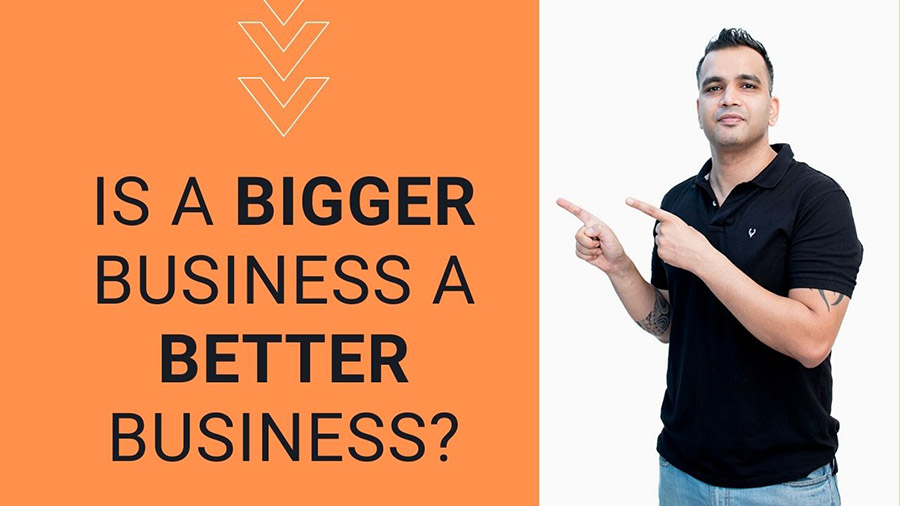Is a bigger business a better business?
One of the common myths I often come across in the entrepreneurial world is that a bigger business always means a better business.
This is not really accurate in my opinion.
I started my first education based business (Creative Pad Media) in 2014 where I create online courses and conduct workshops related to photography and videography. And till this day I run it all by myself. I might have hired a few people for some particular task or work but I’ve never hired a full-time employee.
I never felt the need to have employees and there are many reasons for that but before I get into that, let’s first try to understand what are the factors that are actually important for a business.
I think many people who try their hand at entrepreneurship start with the assumption that there is no other way than to keep growing a business. And that conditioning comes from the false notion that bigger is always better.
The first thing you have to understand is that a bigger business can actually be less profitable than a smaller business (and vice-versa). Just because it’s big doesn’t mean it’s more profitable. Being bigger just means that it is bigger – nothing else is certain.
The main goal of any business, either small or big, has to be generating profit.
Whether that’s done by being a solopreneur or with a team of 500 people, no business can survive without profit.
For instance when I started out with Creative Pad Media, I was happy as long as I was spending less money on marketing and making more via sales. And I was ecstatic when the profit would be higher than what I estimated. It was that simple.
When I started using more advanced software and tools like an Email Marketing software, the only deciding factor would be if the usage of such a software resulted in a higher number of sales than before so that not only was the cost of the software recovered, but its usage generated surplus profit.
I gave that specific example because it teaches a very important lesson, which is the difference between growing and scaling a business. Many people use these terms interchangeably and that’s a mistake.
Let’s take an example to understand the difference between growing and scaling.
Let’s say you are a fitness instructor and you decide to get into the online course business. You create an online course related to fitness and then you start selling your course.
You will incur operational costs in the form of advertising, marketing, using different tools and software, etc. Let’s assume you generate a good amount of sales which cover all those costs and you make a handsome profit. And this repeats over a course of time. So you become confident because your business has started to produce consistent results in the form of profit.
So you think to yourself – Let’s grow this business by hiring an employee so you can delegate some tasks which consume your time. Let’s say you hire a graphic designer who will be responsible towards any designing related work. So you just went from being a solopreneur to running a company with 2 people. You have certainly “grown”. But have you scaled?
To understand that, let’s understand what scaling a business means. Usually the idea is that scaling means growing the revenue, i.e, the top line. But what is often ignored are the costs. If your business grows in revenue but at the same time your operational costs are growing at a similar degree, then it’s not scaling, it’s only growing. True scaling is when you are able to increase the profit, i.e, the bottom line, which means you were able to grow your revenue without incurring significant additional costs.
Now let’s go back to the example above. You hired a graphic designer. The costs related to such decision will mainly be the salary of this employee. The question you’ll have to ask yourself is this – Is the work the graphic designer is doing for you resulting, directly or indirectly, in a situation where it has, at the very least, paid for the cost associated with it (salary)? And in a more realistic scenario, has it not only paid for itself, but added a surplus to the top line too?
For instance, let’s say the graphic designer starts to produce some amazing looking ad templates for your Facebook ads. These professional looking designs result in more conversions of your Facebook ads, which means more sales of your online courses. Or let’s say that the graphic designer freed up so much time for you that you were able to come up with another course and started selling that too. In both cases, the revenue went up and as long as that additional revenue easily covered the salary of the graphic designer,i.e, the revenue grew in a higher proportion than the costs, your decision to hire the designer would be justified. But if that’s not the case, then your company just grew but did not scale. And in the worst case scenario, it actually decreased your profit because your costs increased in a higher proportion than the revenue.
From the example above, you can see that growing a company and growing a company profitably are two different things.
That’s why there is no fixed answer to all this. It completely depends on the results that were generated because of the decision.
One thing you certainly want to avoid is being in a situation where you assumed right from scratch that you need to start something big and you take massive amount of loans when you have not even validated whether your business has the capability to generate a profit or not.
The second point I want to touch upon is your personality.
What exactly do you want?
This is where we get more philosophical and less scientific.
I mentioned before that at Creative Pad Media, I never hired an employee because I never felt the need for one. One of the reasons for that was I was happy with the profit I was making and I found that using automation tools like an Email marketing software and online advertising mechanisms were enough to scale the business and generate a satisfactory profit for me. I did not want to risk hiring someone and have the headache of making sure that the net profit from this decision was going to be higher.
Read that last sentence again – I did not want to risk hiring someone and have the headache of making sure that the net profit from this decision was going to be higher.
What does this tell about me?
It shows that beyond a certain point, I’m more interested in a being stress-free than risking things. That’s a sign of my personality and that’s why I’m taking that decision. There’s no right or wrong here. It’s just that it feels right for me.
There might have been another person in place of me who has a higher capacity for risk and could have easily taken the risk of scaling the company. That decision would be correct for that person, not for me.
I make this point because a lot of people insist on growing their business just because they need to show others that they have a bigger business. This is a pitfall you have to avoid.
There is nothing wrong in scaling your company but in my personal opinion, that moment and time should come to you naturally as you progress in your business. Forcing it and being obsessed with scaling can actually result in only “growing” which, like you saw before, can actually mean not growing at all but just having more frustrations (and possibly higher debts).
So the important takeaway from this article can be summarized in the following points –
- Don’t grow your company for the sake of growing. First concentrate on generating a profit.
- Once you know how to consistently generate a profit, ask yourself if you would like to try your hand at scaling and whether it is a fit with your personality?
- If the answer is Yes, then go ahead and take the steps to scale but keep a close eye on the revenue and operational costs.
- If the answer is No, then keep going on. If there ever is a moment where “growth” is naturally knocking on your doors, you’ll know that is the correct time. And by the way, you can ignore the knock even then.
Let me know your thoughts in the comments below.








informative. but it depends …..
That’s true!
I am in 100 % agreement with your thoughts. contentment has its own role to play. But this is highly subjective and differs for every individual based on various contributing factors.
Most appreciated
That’s correct Kalyan! Ultimately it will be dependent on each individuals own thinking.